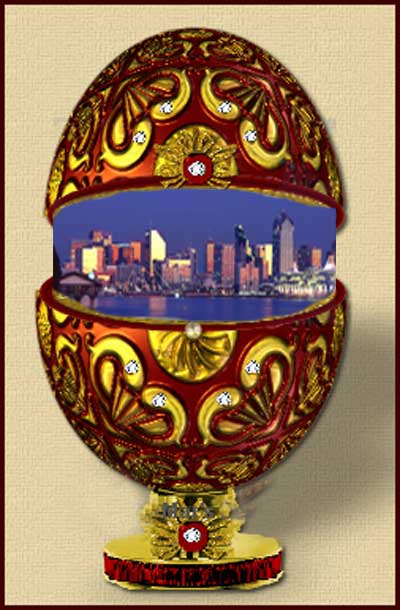
©2006, UrbisMedia
When the woman walked into Dr. Korsakov’s office he had to admit to himself that, outwardly, there didn’t seem to anything discernibly wrong with her. She was young, and beautiful in that tall, healthy, tanned, California-girl stereotypical way. But the report he had from his colleague indicated otherwise; in fact, it was unique case alright.
Dr. Korsakov had been a psychotherapist for thirty years. He had treated every neurotic oddity known to his profession: phobias about everything from heights to household appliances, manias from sex to sushi, people who thought they were elephants or Elvis Presley. But this was something new, and different. This one might get him into Psychology Today. He began as soon as she settled herself on the leather couch and smoothed out her velour exercise suit. “It’s Sandra, isn’t it?”
“Yes, but I prefer Sandi,” she replied.
“Sandi it is then. Sandi, the first thing I must ask is just when you first began imagining that you were a city,” he inquired, stifling an unprofessional urge to snicker.
“What do you mean imagine; I am a city!” she snapped, reminding him that he should approach her on her level of reality. “I’ve felt this way ever since I was a. . .a. . . little. . .a. . .village,” she continued more calmly.
“I see,” Dr. Korsakov mumbled, scribbling a note, “and were you happy when you were a . . . a village?”
“Yes, very happy, it’s only in recent years, since I’ve been grown up, that I just don’t feel fulfilled.”
“Hmm,” Korsakov mused,” could we go with that thought a little bit. What do you mean, not ‘fulfilled’?”
“Well,” she began self-consciously, “I don’t want to sound immodest, but as you can see, I am a rather beautiful city, exceptionally well-endowed by Mother Nature.” Korsakov had to agree with that. Visions of sensuous, undulating topography formed in his mind, lush foliage, and perfumed breezes. With a shudder he shook himself out of this Freudian fantasies.
“A lot of cities would give anything to look like you.” he offered.
“That’s just the point,” she complained, “I’m envied for my beauty, but I don’t want to be just another pretty place, a town that’s great to look at, that everybody wants to live in because I’m the centerfold in American City Magazine.”
“What’s wrong with being desirable,” Korsakov prodded.
“It’s just not enough, I can get all the population I want on my looks, but I want to be desired for more than appearances. I’m not some adolescent village anymore.” She looked like she might begin to cry and Korsakov felt he was onto something.
“What other women, I mean cities , do you admire?” he asked.
“Well, cities like New York, San Francisco, and Boston,” Sandi replied without hesitation.
“Why them?” he pressed on, “they aren’t blessed with your consistently sunny disposition.”
“But they have culture, you know, sophistication,” she said. They’re classy. That’s what I want, culture and class.”
“Well, you had the Super Bowl and the America’s Cup, they’re nothing to be ashamed of,” Korsakov insisted.
“There ya go, just like everybody else, the first thing you think of is sports. She’s a great sports and recreation town that Sandi, I hear them say; boy! look at the beaches on that chick!” She was showing some anger now. “A city get’s tired of hearing that she’s a real sport, an outdoorsy type, an object; but not the sort you’d sit down with over cappuccino to discuss avant garde films and French impressionism. No, I get, ‘Hey Sandi, how’re the Padres doin, how about some body surfing and some fish tacos’. What kind of an image is that!”
“You tell me,” Dr. Korsakov replied non-directively. “It’s an image that doesn’t get any respect,” she growled.
“Maybe you just need to be more assertive about your image,” Korsakov suggested.
“I tried that already,” she countered. “For years I went around calling myself ‘America’s Finest City’; it didn’t work.”
Dr. Korsakov was stumped. He’d have to figure out something to get this city the self-respect she yearned for. Looking for any inspiration he got up and walked over to his little art collection, picked up his facsimile Faberge egg and studied the Russian icons on the wall. “Were out of time today, Sandi,” he said, “but I have an idea I’ll discuss with you next time.” He walked over and pushed the intercom button: “Mrs. Petersen,** please schedule another appointment for Miss Diego.”
___________________________________
©2005, James A. Clapp (UrbisMedia Ltd. Pub. 1.8.2005)
*Originally aired as “Identity Crisis,” on KPBS-FM, public radio, October 19, 1988
**Non-San Diegans may not know that Mrs. Petersen is the married name of then mayor of San Diego, Maureen O’Connor. It was Mayor O’Connor who was instrumental in bringing to San Diego an exhibit from Russia of the renowned Faberge Eggs, and along with it whatever cultural image they might hatch for “America’s Finest City.”
